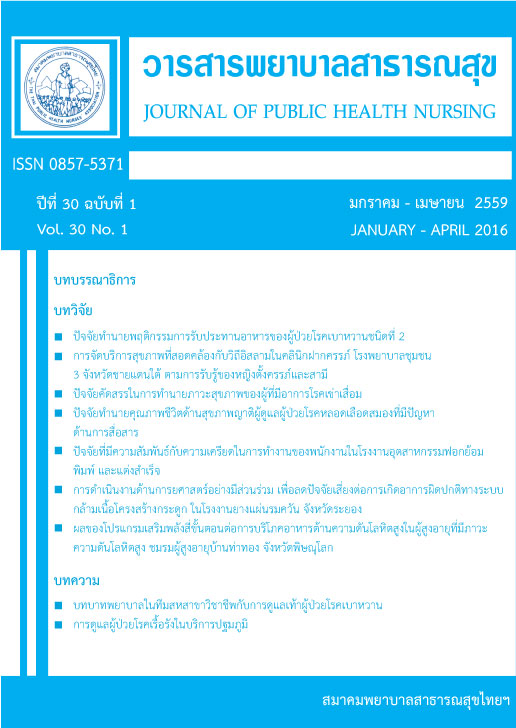ปัจจัยคัดสรรในการทำนายภาวะสุขภาพของผู้ที่มีอาการโรคเข่าเสื่อม
Keywords:
โรคเข่าเสื่อม, การรับรู้มโนภาพความเจ็บป่วย, ภาวะสุขภาพAbstract
ปัจจัยคัดสรรในการทำนายภาวะสุขภาพของผู้ที่มีอาการโรคเข่าเสื่อม
โรคเข่าเสื่อม (ข้อเข่าเสื่อม) เป็นโรคที่ทราบกันดีว่าเกี่ยวข้องกับอายุ โรคเข่าเสื่อมเป็นสาเหตุหนึ่งซึ่งก่อให้เกิดความพิการ และส่งผลกระทบต่อภาวะสุขภาพในผู้ใหญ่และผู้สูงอายุ สำหรับการศึกษาปัจจัยที่มีอิทธิพลต่อภาวะสุขภาพในผู้ใหญ่และผู้สูงอายุไทยที่มีโรคเข่าเสื่อมนั้นยังมีข้อมูลจำกัด ดังนั้นวัตถุประสงค์หลักของการศึกษานี้เพื่อตรวจสอบความสามารถของตัวแปรคัดสรรในการทำนายภาวะสุขภาพของผู้ใหญ่และผู้สูงอายุไทยที่มีอาการโรคเข่าเสื่อม กลุ่มตัวอย่าง จำนวน 327 ราย (อายุระหว่าง 50-90 ปี; อายุเฉลี่ย = 63.49 ปี; ส่วนเบี่ยงเบนมาตรฐาน = 9.8 ปี) เป็นผู้ที่มีอาการโรคเข่าเสื่อมอาศัยในชุมชนกรุงเทพฯ และปริมณฑลที่ผ่านเกณฑ์คัดเข้า เก็บรวบรวมข้อมูลจากผู้เข้าร่วมวิจัยโดยตรงที่บ้านและศูนย์สุขภาพชุมชน หรือโรงพยาบาลส่งเสริมสุขภาพตำบล โดยการสัมภาษณ์ด้วยแบบสอบถาม ประกอบด้วย แบบประเมินความรุนแรงของโรคเข่าเสื่อม แบบสอบถามการรับรู้มโนภาพความเจ็บป่วยฉบับย่อ แบบสอบถามวิธีการเผชิญปัญหาในผู้ป่วยโรคเข่าเสื่อม แบบสอบถามแรงสนับสนุนทางสังคม แบบสอบถามความมั่นใจในสมรรถนะตนเอง และแบบวัดผลกระทบจากโรคข้ออักเสบฉบับย่อ วิเคราะห์ข้อมูลโดยใช้สถิติบรรยาย สหสัมพันธ์เพียร์สัน และการถดถอยพหุคูณ ผลการศึกษาพบว่ากลุ่มตัวอย่างรับรู้ภาวะคุกคามของโรค วิธีการเผชิญปัญหา และภาวะสุขภาพปานกลาง ในขณะรับรู้ความมั่นใจในสมรรถนะตนเอง และแรงสนับสนุนทางสังคมค่อนข้างสูง เมื่อเทียบกับค่าอ้างอิง นอกจากนี้ผลการวิเคราะห์ถดถอยพหุคูณ หลังการควบคุมตัวแปรภายนอก พบว่า การรับรู้มโนภาพความเจ็บป่วย วิธีการเผชิญปัญหา และความมั่นใจในสมรรถนะตนเองอธิบายความแปรปรวนภาวะสุขภาพได้ ร้อยละ 30 โดยการรับรู้มโนภาพความเจ็บป่วย ด้านการรับรู้คุณลักษณะของโรค (ทุกร์ทรมานจากอาการ) และรับรู้ผลกระทบจากความเจ็บป่วยของโรค เป็นตัวแปรที่มีอำนาจสูงสุดในการทำนายภาวะสุขภาพในการศึกษาครั้งนี้
ผลการศึกษาสนับสนุนให้เห็นถึงการรับรู้มโนภาพความเจ็บป่วย วิธีการเผชิญปัญหา และความมั่นใจในสมรรถนะตนเองเป็นปัจจัยสำคัญในการรับรู้ภาวะสุขภาพของผู้ใหญ่และผู้สูงอายุไทยที่มีอาการโรคเข่าเสื่อม ซึ่งข้อมูลครั้งนี้จะเป็นประโยชน์สำหรับการออกแบบกิจกรรม/ โปรแกรมสำหรับส่งเสริมภาวะสุขภาพของประชากรกลุ่มนี้โดยตระหนักถึงการเปลี่ยนแปลงการรับรู้มโนภาพความเจ็บป่วย วิธีการเผชิญปัญหา และส่งเสริมความมั่นใจในสมรรถนะตนเอง
SELECTED FACTORS PREDICTING HEALTH STATUS AMONG PERSONS WITH KNEE OSTEOARTHRITIS
Osteoarthritis of the knee is known as age related diseases, which is common cause of disability in adults and older adults, and can affect their health status. Little is known about factors influencing health status in adult and older Thais with knee osteoarthritis. The major aim of this cross-sectional study was to investigate the predictive power of selected factors on health status in adult and older Thais with self-reported osteoarthritis of the knee. A total of 327 adult and older adults (mean age = 63.49 years; SD =9.8 years; range 50-90 years) with osteoarthritis of the knee living in communities in Bangkok and its vicinity who met inclusion criteria was recruited. The data were collected through home and health care center visits using questionnaires including the Disease Severity Scale, the Brief Illness Perception Questionnaire, the Knee Osteoarthritis Coping Behavior Questionnaire, the Self-Efficacy Expectation Questionnaire, the Social Support Survey, and the Arthritis Impact Measurement Scale Short Form. Data were analyzed using descriptive statistics, Pearson product-moment correlation, and multiple regressions. Results revealed that the sample perceived moderate illness threat, coping strategies, and health status, but perceived quite high level of self-efficacy and social support compared with reference values. In addition, regression analysis showed that, after controlling for external variables, illness representations, coping strategies, and self-efficacy explained 30% of variance in health status. Identity and serious consequences of illness representation dimensions were the strongest predictors.
The findings demonstrate that illness representations, coping strategies, and self-efficacy are important factors in perceived health status among adult and older Thais with self-reported knee osteoarthritis. These findings can be beneficial for the design of intervention by mean of changing illness perceptions and coping strategies and of promoting self-efficacy that may improve health status in this population.
Downloads
Published
How to Cite
Issue
Section
License
บทความที่ตีพิมพ์และแผนภูมิรูปภาพถือเป็นลิขสิทธิ์ของวารสารพยาบาลสาธารณสุข (Thai Public Health Nurses Association)







